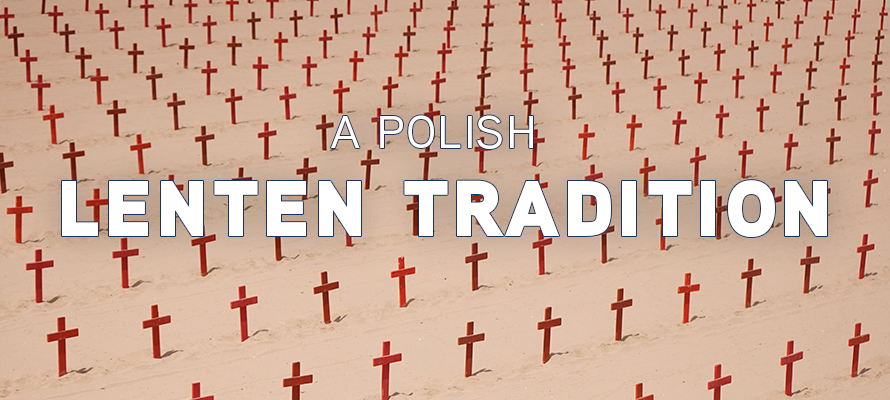
Lent is fast approaching. Before the fasting and abstinence of Ash Wednesday of course comes the feasting of Shrove or Fat Tuesday. Cakes and sweets and pastries, oh my! And don’t forget the popular Polish paczki—donuts filled with jelly or cream then deep fried and covered with powdered sugar, icing or glaze. (You’re drooling just a bit, aren’t you?)
But Poland has given us an even better tradition for Lent itself. It’s a prayer service called Gorzkie Żale, or Bitter Lamentation. It takes place on the Sundays of Lent. Primarily through hymns but also prayer intentions, participants are called to reflect on the Passion of Christ as relayed in Scripture.
The tradition has its roots in the early 1700s in Warsaw. A Vincentian priest, Fr. Lawrence Benik, collected and published several hymns and chants reflecting on Christ’s bitter Passion. Through the 18th century the format was modified to include Exposition and Benediction of the Blessed Sacrament, intentions and an optional homily.
The service consists of three parts, each with a different focus and prayer intentions. Each part includes an opening hymn designed to “awaken the soul,” followed by the stated focus or “intention” for that service. Three songs follow—one simply called “Hymn” that recalls Triduum events as told in Scripture, then “The Soul’s Lament” and finally “Mary’s Dialog with the Soul.” The final Gorzkie Żale service on Good Friday combines all three parts.
The first part focuses on the Agony in the Garden through Christ’s trial by the Sanhedrin: “In this first part of our contemplation, let us recall our Lord’s sufferings, beginning with His prayer and bloody sweat in the Garden of Gethsemane and ending with His unjust accusation before the tribunal of Sanhedrin.” The prayers are offered for the Church, clergy and religious, for the “enemies of His cross” and for unbelievers. It is offered on the first and fourth Sundays of Lent.
The second part calls participants to “meditate on the sufferings of our Lord Jesus Christ from the time he was accused before the Sanhedrin until the moment when He was crowned by thorns,” and to “offer to God the Father the wounds, indignities and insults of our Lord Jesus in the hope that all nations may live in peace and harmony with one another, that Christian charity may rule in the hearts of men, and that true unity and lasting peace may reign in the world.” This part is offered on the second and fifth Sundays of Lent.
The third part reflects on “the sufferings of Jesus from the time He was nailed to the cross until the moment He breathed His last on that infamous cross.” Among the intentions for this service are for the “faithful living and dead,” “hardened sinners” and the souls in purgatory. This part is offered on the third Sunday of Lent and on Palm Sunday.
While similar in intent to the Stations of the Cross, Gorzkie Żale reflects on the entire Passion of Christ, contemplating Christ’s wounds and the injustice and scorn he endured as detailed in Scripture. The hymns call on the soul to love Christ more for all He endured for our salvation.
Those who worship in or live near a Polish-founded parish might be able to participate in Gorzkie Żale services. You can also pray the prayers and sing the hymns on your own. A Gorzkie Żale service in English can be found at cutt.ly/GorzkieZale.
While the timing usually doesn’t allow for a true Polish Gorzkie Żale, a Tekton pilgrimage to Poland will expose you to many other rich Polish Catholic traditions, including a visit before the famous Black Madonna icon in Czestochowa, through which many miracles have been attributed, and a tour of the Divine Mercy Shrine in Krakow, where the Divine Mercy devotion has its origins. For more information on pilgrimages to Poland, go to https://www.tektonministries.org/pilgrimage-to-poland/
Meanwhile, perhaps praying and singing the Polish traditional Gorzkie Żale will add meaning to your Lent and draw you closer to Christ.




